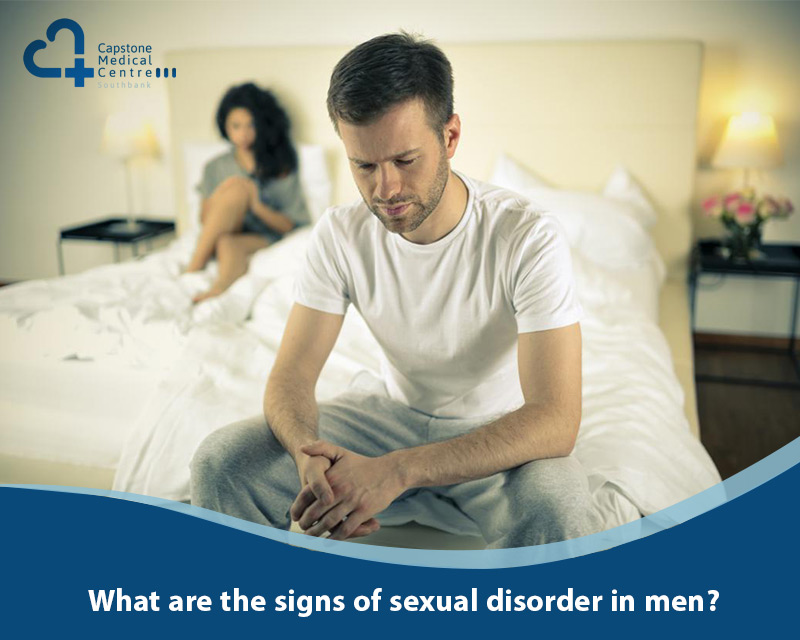Struggling with your sex life? Sexual dysfunction in men, also known as male sexual problems, is more common than you might think. Studies show that over half of Australian men experience some form of sexual difficulty at some point in their lives.
But Sexual dysfunction is treatable. Early diagnosis and talking openly with a healthcare professional are key to getting back on track and enjoying a healthy sex life.
There are several categories of sexual disorders in men, including issues with desire, arousal, orgasm, and pain. This post from Capstone Medical Centre will explore the signs and symptoms of each, along with potential causes.
Remember, open communication with your doctor or a men’s health clinic is crucial for a proper diagnosis and finding the right treatment plan for you.
Types of sexual disorders in men
Desire Disorders
Low Libido and Lack of Interest: One of the main signs of a sexual disorder in men is a significant decrease in sexual desire, often referred to as low libido. This can manifest as a lack of interest in initiating sexual activity or a general feeling of disconnection from your partner.
While the cause can sometimes be physical, such as hormonal imbalances or certain medications, stress, depression, and relationship issues are also common culprits for low libido in Australian men. If you’re experiencing these symptoms, talking to your doctor or a men’s health professional can help pinpoint the cause and develop a treatment plan to reignite your sex life.
Arousal Disorders
Trouble Getting or Keeping It Up? Erectile dysfunction (ED), the inability to achieve or maintain an erection firm enough for sexual intercourse, is a common arousal disorder in men. While occasional difficulty can be normal due to stress or fatigue, persistent ED can be a sign of underlying health issues.
Physical conditions like vascular disease, which restricts blood flow to the penis, or nerve damage can contribute to ED. If you’re experiencing ongoing problems with erections, talking to your doctor can help identify the cause and explore treatment options for a more fulfilling sex life.
Orgasm Disorders
Climaxing Concerns: Difficulty achieving orgasm can also be a sign of a sexual disorder in men. This can include delayed ejaculation, where orgasm takes a significantly longer time than usual, or premature ejaculation, where orgasm happens too quickly with minimal stimulation.
While hormonal imbalances can sometimes play a role, psychological factors like anxiety, performance pressure, or relationship issues are also common contributors to orgasm disorders in Australian men. A healthcare professional can help explore the underlying cause and develop a treatment plan to improve your sexual satisfaction.
Pain Disorders
Sex Shouldn’t Hurt: Pain during intercourse can be a sign of a sexual disorder in either you or your partner. This can include pain in the penis, testicles, or even discomfort experienced by your partner due to conditions like vaginismus (involuntary vaginal muscle contractions).
Ignoring pain can worsen the problem. Seeking medical advice from your doctor or a men’s health clinic is crucial to identifying the underlying cause, such as infections, nerve problems, or skin conditions. Early diagnosis and treatment can ensure a pain-free and enjoyable sex life for you and your partner.
Common Signs and Symptoms
Is your sex life not quite right? Here are some key indicators for each category of sexual disorder in men:
- Desire Disorders: Significant decrease in sexual desire and lack of interest in initiating intimacy.
- Arousal Disorders: Difficulty achieving or maintaining an erection, reduced penile sensation.
- Orgasm Disorders: Delayed or premature ejaculation, difficulty reaching orgasm.
- Pain Disorders: Pain during intercourse for you or your partner.
Remember, occasional difficulties are normal. However, if these symptoms persist for an extended period, seeking help from a healthcare professional or a men’s health clinic is important. Early diagnosis and treatment can make a big difference in getting your sex life back on track.
Physical Causes of Sexual Dysfunction
While sexual dysfunction in men can sometimes be psychological, underlying health conditions can also play a role. Chronic diseases like diabetes, heart disease, and high blood pressure can affect blood flow and nerve function, leading to difficulties with arousal and erection. Hormonal imbalances, particularly low testosterone, can also contribute to sexual problems in men.
Medications you’re taking for other health issues and substance use can also impact sexual function. If you’re concerned about medications or lifestyle habits affecting your sex life, talking to your doctor can help explore alternative options and improve your overall sexual health.
Conclusion
Experiencing sexual difficulties can be frustrating and isolating, but it’s important to remember you’re not alone. Recognizing the signs of sexual dysfunction, like those outlined here, is the first step towards a healthier sex life.
Open communication with a healthcare professional is crucial. Don’t hesitate to talk to a doctor or a men’s health clinic at Capstone Medical Centre. We can help identify the underlying cause of your sexual problems and develop a personalized treatment plan. You can call us directly or book an appointment online.
Sources:
- www.amhf.org.au/more_than_half_aussie_men_report_experiencing_sexual_difficulties
- pubmed.ncbi.nlm.nih.gov/17233791
- my.clevelandclinic.org/health/diseases/9121-sexual-dysfunction


2 thoughts on “What are the signs of sexual disorder in men?”
Comments are closed.